My blog has moved! http://www.patheos.com/blogs/markdroberts/
|
 |
Twitter Feed for My Recent Blog Posts and Other Tweets |
My blog has moved! http://www.patheos.com/blogs/markdroberts/
|
Evensong in London
By Mark D. Roberts | Saturday, July 28, 2007
 While in London, my wife and I attended a Sunday Evensong service at St. James Paddington Anglican church. While walking in, I noticed the sign advertised: “Professional choir at both service.” This made me worry a bit. Are folks coming to hear beautiful music, or to worship and commune with God.
While in London, my wife and I attended a Sunday Evensong service at St. James Paddington Anglican church. While walking in, I noticed the sign advertised: “Professional choir at both service.” This made me worry a bit. Are folks coming to hear beautiful music, or to worship and commune with God.
 As it turned out, not many people were there for either experience. Though the church could hold a few hundred people, there were probably fewer than ten people present, plus two priests and six members of the professional choir. Indeed, the choir sang beautifully. And their music echoed throughout the sanctuary. It was so acoustically alive that it was very hard to understand the spoken part of the Evensong service.
As it turned out, not many people were there for either experience. Though the church could hold a few hundred people, there were probably fewer than ten people present, plus two priests and six members of the professional choir. Indeed, the choir sang beautifully. And their music echoed throughout the sanctuary. It was so acoustically alive that it was very hard to understand the spoken part of the Evensong service.
 I can’t comment on what was in the hearts of the others who gathered that evening. I know that I found it difficult to pray, partly because I was so moved by the aesthetic qualities of the service. The choral music was, indeed, of highest quality. But, even more, I found the visual aesthetics to be unusually striking. With incense filling the sanctuary (technically, the nave), and with the evening sunlight shining through the high windows, I was moved by the beauty of the moment. Perhaps if I were a regular participant in this Evensong, I’d learn to let the aesthetic experience point me in the direction of worship.
I can’t comment on what was in the hearts of the others who gathered that evening. I know that I found it difficult to pray, partly because I was so moved by the aesthetic qualities of the service. The choral music was, indeed, of highest quality. But, even more, I found the visual aesthetics to be unusually striking. With incense filling the sanctuary (technically, the nave), and with the evening sunlight shining through the high windows, I was moved by the beauty of the moment. Perhaps if I were a regular participant in this Evensong, I’d learn to let the aesthetic experience point me in the direction of worship.
Topics: European Reflections | 1 Comment »
Heaven’s Gain, Our Loss
By Mark D. Roberts | Friday, July 27, 2007
Heaven recently gained one of the finest men I ever knew, Raymond Ortlund. No doubt about it, heaven’s gain is our loss.
Ray had a broad and blessed ministry as a pastor, preacher, teacher, writer, and discipler. He served as pastor in several churches, including the Lake Avenue Community Church in Pasadena, California, where is preached for twenty years. Among Ray’s numerous writings, Make My Life a Miracle is the most well-known. Written with his wife Anne, this book was originally published in 1974, and is still in print today. I actually read this book while in college, and was both challenged and encouraged by it.
After many years of pastoring churches, Ray became the Bible teacher for the Haven of Rest radio ministry, now known as Haven Today. Through his fine teaching, Ray touched hundreds of thousands of people. More recently, Ray was a leader in Renewal Ministries, traveling throughout the world to train and encourage pastors and other Christian leaders.
What I’ve just written about Ray only scratches the surface of his resumé. No doubt you can see why I’ve said that Ray’s death is our loss. But my perspective on Ray’s life has little to do with his official ministries. Other than reading Make My Life a Miracle and listening to a few of his radio broadcasts, I had little exposure to the official Ray Ortlund. Almost all of my experience of Ray was more personal.
I first got to know him through his family. His daughter, Sherry, was a member of my church, along with her husband, Walt, and their children. Ray would come to special services at our church, where we’d chat informally. I was impressed by his friendliness and kindness. He always had an encouraging word for me, usually two or three.
Knowing some of Ray’s family closely, and others by reputation, I was impressed by what I saw. His children and grandchildren were fantastic people, some of the best saints on earth. I figured that Ray must be a fine man to have such an effective ministry and an excellent family. Pastors often find it easier to be great pastors and lousy fathers. Ray, obviously, excelled at both.
Most of my personal experience of Ray came, not through his family, but because we worked out at the same gym. For about ten years we sweated together. I noted with admiration how Ray was in such good shape for a man in his seventies, and resolved to try to take care of my body as he did.
During the decade in which Ray and I met in the gym, we had probably a hundred conversations. I’d ask him about his ministry, which usually involved trips to such exotic places as Mongolia. And he’s ask me about my ministry. Time after time he’d offer words of affirmation. If I shared he particular frustration, Ray would be quick to empathize and offer welcome bits of wisdom. We’d always talk about Ray’s family, especially his grandchildren. No grandfather was prouder or more in love with his grandchildren. And since I shared his admiration for them (the ones I knew, especially), Ray didn’t hold back.
I never really knew Ray Ortlund the minister. But I knew Ray Ortlund the man, the father, the brother-in-Christ. I knew him to be a deeply loving man, one of the kindest and most encouraging people I have ever met. And I am not exaggerating here. Ask anybody who knew Ray, and they’ll tell you the same.
Today, as I thank God for the life of Ray Ortlund, I am resolving to be more like him. I want always to have time to be friendly. I want to be quick with genuine words of praise and encouragement. I want to shine with the light of Christ, not only when I’m “on duty,” but also when I’m just a guy on the stair-stepping machine at the gym.
Thank you, Lord, for Ray. I know you’ll enjoy his company. I sure did. Please bless his dear family with your peace and comfort. Amen.
Topics: Tributes | 2 Comments »
Just in Case You’re Confused
By Mark D. Roberts | Wednesday, July 25, 2007
 Just after I got off the plane in London, I saw the sign to the right. I had to chuckle. Of course we Americans would refer euphemistically to the “Women’s Restroom,” though women don’t actually rest in such places. We Americans aren’t quite so blunt about the existence of toilets in our so-called restrooms.
Just after I got off the plane in London, I saw the sign to the right. I had to chuckle. Of course we Americans would refer euphemistically to the “Women’s Restroom,” though women don’t actually rest in such places. We Americans aren’t quite so blunt about the existence of toilets in our so-called restrooms.
But, even more, I was impressed with the British effort to be very clear. If you’re not sure what a female toilet is, the sign adds “Male toilet opposite.” Now what could be clearer than that? No doubt about it. A female toilet is, most certainly, the opposite of a male toilet.
(Yes, yes, of course I know the real meaning of “opposite”.)
Topics: European Reflections | 2 Comments »
More from Kensington Gardens
By Mark D. Roberts | Tuesday, July 24, 2007
Part 8 of series: European Reflections 2006
Permalink for this post / Permalink for this series
In my last post I talked a bit about Peter Pan, who was “created” in Kensington Gardens, Londan, through the creativity of J. M. Barie. Today I thought I’d share a few more fun pictures from this lovely park.
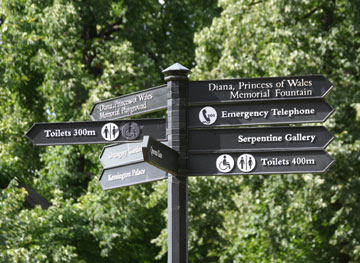 There are lots of signs throughout Kensington Gardens, which is especially helpful for tourists. But my favorite part of the signs was the detail attached to those indicating where the toilets were. We’d say “restrooms,” of course. If you look closely at the picture to the right, you’ll see that the sign specifies the precise distance to a given toilet. In one direction you’ve got a walk of 300 meters. It’s 400 in the other direction. How helpful! Especially if, as you’re looking at the sign, you’re feeling particularly desperate to find the nearest toilet. Those British are so thoughtful.
There are lots of signs throughout Kensington Gardens, which is especially helpful for tourists. But my favorite part of the signs was the detail attached to those indicating where the toilets were. We’d say “restrooms,” of course. If you look closely at the picture to the right, you’ll see that the sign specifies the precise distance to a given toilet. In one direction you’ve got a walk of 300 meters. It’s 400 in the other direction. How helpful! Especially if, as you’re looking at the sign, you’re feeling particularly desperate to find the nearest toilet. Those British are so thoughtful.
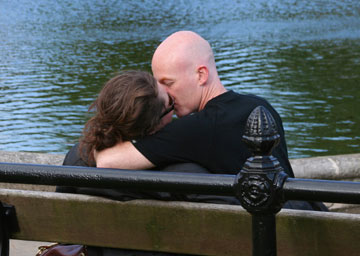 As my wife and I walked around London, I saw a greater variety of people than I have seen anyplace else, I think. There were beautiful people, immaculately dressed, and homeless folk in virtual rags. There were lots of young, atheletic folk jogging through the parks and along the Thames, and there were dowdy, older folk who looked as if they were the poster children for the stereotypical British middle class. No doubt they boiled their vegetables and had tea every afternoon. There were many people walking alone in Kensington Park, enjoying the sylvan beauty and the quiet. And there were also many couples strolling along romantically, or, as you can see in the photo to the right, snogging in public, seemingly oblivious to all who were walking by. (”Snogging” is a British word made popular by J.K. Rowling. From the picture you can guess the meaning.)
As my wife and I walked around London, I saw a greater variety of people than I have seen anyplace else, I think. There were beautiful people, immaculately dressed, and homeless folk in virtual rags. There were lots of young, atheletic folk jogging through the parks and along the Thames, and there were dowdy, older folk who looked as if they were the poster children for the stereotypical British middle class. No doubt they boiled their vegetables and had tea every afternoon. There were many people walking alone in Kensington Park, enjoying the sylvan beauty and the quiet. And there were also many couples strolling along romantically, or, as you can see in the photo to the right, snogging in public, seemingly oblivious to all who were walking by. (”Snogging” is a British word made popular by J.K. Rowling. From the picture you can guess the meaning.)
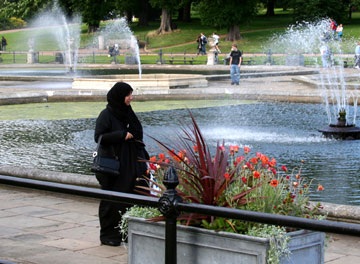 I was especially impressed by the ethnic diversity throughout London, including Kensington Gardens. I wonder if London is the most international, multi-cultural city on Earth. Though I saw plenty of Anglos, I was amazed by the number of Indians, Africans, Middle-Easterners, and Asians. Among the Muslim women, some wore simple scarves, while others were dressed in complete burkas, with only their eyes showing. In the photo to the right, the woman is not wearing a full burka, since her face is visible. In days gone by, the world was ruled out of London. Today, the world has come to Longdon.
I was especially impressed by the ethnic diversity throughout London, including Kensington Gardens. I wonder if London is the most international, multi-cultural city on Earth. Though I saw plenty of Anglos, I was amazed by the number of Indians, Africans, Middle-Easterners, and Asians. Among the Muslim women, some wore simple scarves, while others were dressed in complete burkas, with only their eyes showing. In the photo to the right, the woman is not wearing a full burka, since her face is visible. In days gone by, the world was ruled out of London. Today, the world has come to Longdon.
Topics: European Reflections | 1 Comment »
Peter Pan Still Charms
By Mark D. Roberts | Monday, July 23, 2007
Part 7 of series: European Reflections 2006
Permalink for this post / Permalink for this series
One of the most beloved of plays written for children is Peter Pan, by J. M. Barie. It began with stories that Barie told the children of a close friend, Sylvia Llewelyn Davies. One of these children, Peter, gave Peter Pan his first name. His last name came from Pan, the god of the forest.
Barie set his original story of Peter Pan, not in some far away place called neverland, but in Kensington Gardens, a stunning park in London (next to Hyde Park). In fact, Barie’s earliest story of Peter Pan is called, Peter Pan in Kensington Gardens. The first chapter is called, “The Grand Tour of the Gardens,” and begins this way: “You must see for yourselves that it will be difficult to follow Peter Pan’s adventures unless you are familiar with the Kensington Gardens.” It was in Kensington Gardens that J. M. Barie first met members of the Llewelyn Davies family. And here he frolicked with the children, which inspired the writing of Peter Pan. (Photo: The Peter Pan statue in Kensington Gardens)
 Kensington Gardens are wonderfully preserved today, filled with trees, flowers, and people of and shapes and sizes. One of the highlights of the Gardens is a statue of Peter Pan. When I visited this statue last month, I wasn’t surprised to see that it a favorite of children.
Kensington Gardens are wonderfully preserved today, filled with trees, flowers, and people of and shapes and sizes. One of the highlights of the Gardens is a statue of Peter Pan. When I visited this statue last month, I wasn’t surprised to see that it a favorite of children.
Shortly after I snapped the picture to the right, the parents of the boy in the blue and white striped shirt determined that it was time for the family to move on. “C’mon, Jason, they called, we’ve must be going.” But do you think Jason was willing to leave Peter Pan behind? Not on your life! His parents kept calling, but Jason wouldn’t climb down. As I watched this spectacle, I thought to myself, “Now there are some parents that didn’t think this through very carefully. They brought their son to Peter Pan. They let him climb all over Peter Pan. And now they think he’s going to leave? Haven’t they ever seen the play? Don’t they know the power of Peter Pan.” More than a century after J. M. Barie first wrote about this magic boy, he still charms.
So if you’re ever in London, by all means visit Kensington Gardens. Be sure to find the statue of Peter Pan. But if you’ve brought your young children, look out.
Topics: European Reflections | 2 Comments »
Sunday Inspiration from Pray the Psalms
By Mark D. Roberts | Sunday, July 22, 2007
Excerpt
May he grant you your heart’s desire,
and fulfill all your plans.
Psalm 20:4
Click here to read all of Psalm 20
Prayer
O Lord, You are the one who can grant my heart’s desire. Indeed, as I reflect upon what I truly want in life, You are my heart’s desire! Sure, there are other things I want, and many of these are good things: a healthy family, a fulfilling ministry, to make a difference for You in this world. But, more deeply, I desire You . . . Your presence, Your delight, Your peace. Only You can give me these.
Gracious God, I would ask You to fulfill my plans. But before that, I’d ask that my plans be Your plans. May my goals be Your goals. I’m so aware of my tendency to make plans that seem right, but that aren’t what You have in mind. So help me, Lord, to seek You above all, to follow Your ways, and to align my plans with Yours.
Postscript
23 Nevertheless I am continually with you;
you hold my right hand.
24 You guide me with your counsel,
and afterward you will receive me with honor.
25 Whom have I in heaven but you?
And there is nothing on earth that I desire other than you.
26 My flesh and my heart may fail,
but God is the strength of my heart and my portion forever.
27 Indeed, those who are far from you will perish;
you put an end to those who are false to you.
28 But for me it is good to be near God;
I have made the Lord GOD my refuge,
to tell of all your works.
Psalm 73:23-28

Kensington Garden, London, England
Topics: Sunday Inspiration | No Comments »
Santorini
By Mark D. Roberts | Saturday, July 21, 2007
 Santorini is a collection of islands in the southern Aegean Sea. Technically, it’s called an archipelago, and it is part of Greece. Santorini was formed from an ancient volcano, which, when it blew its top, left a circular group of islands arond a central caldera. (The photo shows part of Oia.)
Santorini is a collection of islands in the southern Aegean Sea. Technically, it’s called an archipelago, and it is part of Greece. Santorini was formed from an ancient volcano, which, when it blew its top, left a circular group of islands arond a central caldera. (The photo shows part of Oia.)
We visited Santorini for a day as one of the stops on our cruise. It’s a desirable tourist location because of its quaint villages and inviting beaches. One of the villages we visited was Oia (pronounced EE-ah), which lies to the north of the main island. Oia was extraordinarily picturesque, with its multi-colored houses and blue-domed churches.
 The main town on Santorini is Fira. In the summer it’s filled with tourists and the usual tourist stops (souvenier stores, jewelry stores, etc.) Fira is perched on one of the cliffs above the ocean. In order to get back to our ship, we walked down a six-hundred-foot pathway, which was both steep and covered, I’m sad to say, with donkey droppings. Most people don’t walk up or down, but ride on donkeys instead. The walk was fine, except for the fact that it was about 100 degrees. (If you look closely in the photo of Fira to the right, you can see the path down which my wife and I walked.)
The main town on Santorini is Fira. In the summer it’s filled with tourists and the usual tourist stops (souvenier stores, jewelry stores, etc.) Fira is perched on one of the cliffs above the ocean. In order to get back to our ship, we walked down a six-hundred-foot pathway, which was both steep and covered, I’m sad to say, with donkey droppings. Most people don’t walk up or down, but ride on donkeys instead. The walk was fine, except for the fact that it was about 100 degrees. (If you look closely in the photo of Fira to the right, you can see the path down which my wife and I walked.)
I didn’t get to one of the beaches. Friends who did said they were glorious. Gotta leave something for my next visit, however.
Topics: European Reflections | 1 Comment »
Photos from Ephesus
By Mark D. Roberts | Friday, July 20, 2007
 On our recent trip to Europe, we had the chance to visit Ephesus, which lies just off the western coast of Turkey. Some of what we saw in Ephesus was truly amazing, such as the theatre in the photo to the right.
On our recent trip to Europe, we had the chance to visit Ephesus, which lies just off the western coast of Turkey. Some of what we saw in Ephesus was truly amazing, such as the theatre in the photo to the right.
 Only a few steps from the place where I snapped the photo of the theatre I saw a couple of other signs that gave me a chuckle. One was for a bathroom, or WC as they’re called in Turkey. Yes, the sign does indeed read: “Only 50 cent is enough to feel the magic atmosphere.” No, I did not invest 50 cents on the experience.
Only a few steps from the place where I snapped the photo of the theatre I saw a couple of other signs that gave me a chuckle. One was for a bathroom, or WC as they’re called in Turkey. Yes, the sign does indeed read: “Only 50 cent is enough to feel the magic atmosphere.” No, I did not invest 50 cents on the experience.
 The other sign was promoting watches. And not just ordinary watches, but fake watches that looked like Gucci and Rolex. But these were not just ordinary fake watches. The were “Genuine Fake Watches.” I think this sign was meant to be humorous. And, no, I didn’t buy a genuine fake watches, even though the salesmen were in my face (literally). If you visit Ephesus, which I highly recommend, be prepared to be almost rude unless you want to buy lots of genuine fake watches.
The other sign was promoting watches. And not just ordinary watches, but fake watches that looked like Gucci and Rolex. But these were not just ordinary fake watches. The were “Genuine Fake Watches.” I think this sign was meant to be humorous. And, no, I didn’t buy a genuine fake watches, even though the salesmen were in my face (literally). If you visit Ephesus, which I highly recommend, be prepared to be almost rude unless you want to buy lots of genuine fake watches.
I’ll have more to share in a more serious vein about Ephesus. But I though you might enjoy these pictures.
Topics: European Reflections | 2 Comments »
Friends
By Mark D. Roberts | Thursday, July 19, 2007

Friends sitting in an open market in Tuscania, Italy.
Topics: European Reflections | 1 Comment »
Being in London as History is Made
By Mark D. Roberts | Wednesday, July 18, 2007
Part 6 of series: European Reflections 2006
Permalink for this post / Permalink for this series
As the last leg of our European sojourn, my wife and I spent six days in London. We were there from July 1 to July 7. Though it was not our plan, we ended up there as history was being made.
What history, you ask?
Well, I’m not talking about the bomb threats, though these were certainly newsworthy. Right before we arrived in London, car bombs were discovered in the city, and during our stay a burning jeep was crashed into the Glasgow Airport in Scotland. For a good part of one day Heathrow Airport was closed because of concern over a piece of abandoned luggage. That was a false alarm, but the threat of terrorist bombings was certainly a major concern while we were in London. Yet this is not the historic part.
I’m not referring to other items that made lots of news during our London stay, These included:
• Wimbledon tennis tournament just outside of London, which fought to remain afloat amid heavy rains.
• The London premiere of Harry Potter and the Order of the Phoenix, which my wife and I just happened to stumble upon. We stuck around for a while, and I even spied Rupert Grint (Ron Weasley) and Emma Watson (Hermione Granger) in person, though from a distance. The whole event must have included 10,000 screaming teenage girls. Quite fun, but hardly historic.
• The pound at a twenty-six year high against the dollar. Now this wasn’t much fun at all for us travelers from the U.S. It wasn’t hard to figure out prices. You just double the pound number to get the number of dollars (almost). I hated paying $8.00 for a sandwich that was worth about $4.00.
• The start of the Tour de France in London. Yes, indeed, this most famous of bike races, this truly French bike race, began in London this year. It was not the first time this has happened. In 1974 and then again in 1994 the Tour included a British stage. No, they didn’t change the name to Le Tour de France et Angleterre.
So, if it wasn’t the bomb threats, or Wimbledon, or Harry Potter, or the pound, or the Tour de France that was so historic, what am I talking about? Indeed, I’m referring to an event that happened for what was probably the first time in over four centuries. I’m talking about something that I personally experienced, though it impacted the whole of the United Kingdom. I’m speaking of something that, ironically enough, fits perfectly with the theme of my recent blogging. What is this monumental event? I sat in an English pub without smelling cigarette smoke. (Photo to the right: interior of the pub where I had dinner on July 1, 2007. Do the empty seats reflect the change in the law?)
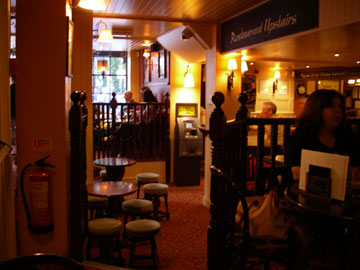 Actually, that’s just one small implication of the historic event. The fact is that on July 1, 2007, nobody was smoking in English pubs. Or at least nobody should have been. On that date smoking in pubs, and in most other indoor public places, was illegal for the first time in British history. And this means for the first time in hundreds of years.
Actually, that’s just one small implication of the historic event. The fact is that on July 1, 2007, nobody was smoking in English pubs. Or at least nobody should have been. On that date smoking in pubs, and in most other indoor public places, was illegal for the first time in British history. And this means for the first time in hundreds of years.
Pubs have been around in England for around a thousand years. The Trip to Jerusalem (no joke!) pub claims to be the oldest in the country, and it was founded in 1189 AD (see their website). Smoking was introduced to England sometime in the second half of the 16th century. There’s a debate about the precise details. This means that people have been smoking in English pubs for over four hundred years . . . until July 1, 2007.
I’m sure some folks still smoked in their favorite pubs on that date. There had been some comments on the news about people committing acts of civil disobedience. But during my week in London, I didn’t see anybody breaking the law. The smokers had gathered on the outside, sitting at small tables. In once case I saw two men sitting outside as they enjoyed an ale, a smoke, and fervent conversation, while it was raining. Now that’s commitment!
For what it’s worth, I’m not a smoker, but I’m not a fervent anti-smoker. In fact, if I wrote the laws, I’d give the pub owners the freedom to decide whether their establishments would be smoking or non-smoking. When I was hungry, I would choose to do business with non-smoking pubs, as would many others, I expect. In time, the market would decide what’s works best, and I imagine there would be smoking pubs and non-smoking pubs.
Nevertheless, I was glad to be able to enjoy my fish and chips (translation: “French fries”) in a smoke-free environment. Now, if only those chaps would stop arguing in such loud voices, I could have a truly pleasant meal. Perhaps in time they’ll pass a law outlawing shouting. Who knows?
Topics: European Reflections | 2 Comments »
Flowers, Anyone?
By Mark D. Roberts | Tuesday, July 17, 2007
The flowers throughout London are wonderful, especially in flower boxes and hanging baskets. On their exteriors, most pubs feature baskets spilling over with bright, colorful flowers. But the Churchill Arms has to take the cake (or the scone, or whatever you take in Britain). This pub, just to the west of Kensington Garden, has more flowers than one could imagine. Hence the photo below:

In case you’re interested, the address of The Churchill Arms is 119 Kensington Church Street. (Google map location here.) I didn’t eat there, but I assume it has hearty pub fare.
Topics: European Reflections | 2 Comments »
Why Do Europeans Smoke So Much? Section B
By Mark D. Roberts | Monday, July 16, 2007
Part 5 of series: European Reflections 2006
Permalink for this post / Permalink for this series
In my last post I began to theorize on why Europeans, in general, smoke more than Americans. My first idea was:
Reason #1: Europeans Smoke More Because They’re Less Aware of the Health Risks Associated with Smoking
Today I’ll suggest two further reasons.
Reason #2: Smoking Seems to be Imbedded in European Socializing More Than It is in the U.S.
Admittedly I’m no expert here, but from my casual observations, it seems that smoking in Europe goes hand-in-hand with conversation, especially in the evening. Throughout Europe people by the millions sit in little cafés, tavernas, and pubs, enjoying a drink, a smoke, and animated conversation with friends. Americans, in general, do not tend to enjoy after-work conversation over a cigarette. Rather, we work longer hours, or sit in our cars and trains commuting long distances from work to home, or, when we finally get home, we cozy up to our televisions for some private moments of news and entertainment. (Photo to the right: Two young people in Nice, enjoying a cafe and a cigarette)
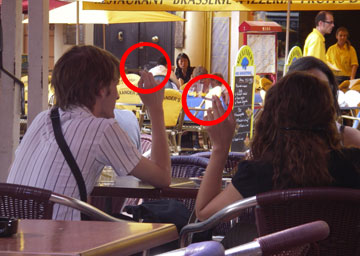 If I’m correct, and socializing in the evening is much more common in Europe than in the U.S., and if smoking is an adjunct to that tradition, then it would make sense that more Europeans smoke, and that this practice is embedded within their culture.
If I’m correct, and socializing in the evening is much more common in Europe than in the U.S., and if smoking is an adjunct to that tradition, then it would make sense that more Europeans smoke, and that this practice is embedded within their culture.
Reason #3: A Substantial Segment of American Society Regards Smoking as Immoral on Religious Grounds, Whereas Relatively Few Europeans Share This Conviction
Millions of Americans, almost always of the conservative Christian variety, were raised to believe that smoking is not just unhealthy, but downright sinful. (Many committed Muslims also believe smoking is wrong.) Even though my church and family did not teach the view that smoking was necessarily sinful, I nevertheless intuited that smoking was wrong. Now I have no idea what percentage of the American population continues to hold this belief, but I wouldn’t be surprised if it was 10% or more. If so, then this helps to explain the difference between European and American smoking practices. A substantial number of Americans believe it is wrong at best, and downright sinful at worst.
Moreover, the relatively recent increase of anti-smoking activism in America has forged an unusual coalition between secular liberals and conservative Christians. Though they might disagree on almost everything else, they passionately concur on the evils of smoking. Thus the legal and cultural pressure against smoking in the U.S. is stronger than that in Europe.
Europe, of course, has much fewer conservative Christians than the U.S. But I was once surprised to discover that many evangelical Christians in Europe do not share the American disdain from smoking (and drinking). This is not to say that most European evangelicals smoke, of course. They don’t. But they do seem to be less “agin it” than their American counterparts. It will be interesting to see if the growing Muslim presence in Europe leads to less smoking.
Conclusion
I’m not a social scientist, or even a particular experienced European traveler. I’ve been there three times, for a total of six weeks. So I have no idea whether my analysis in this blog post will hold water or not. Yet I wouldn’t be at all surprised if my reasons #2 and #3 do help to explain the differences between European and American smoking patterns, in additon to reason #1, which is based on sociological research. Both of my reasons have to do with culture, and culture is a powerful influence on human behavior.
Topics: European Reflections | 7 Comments »
Sunday Inspiration from Pray the Gospels
By Mark D. Roberts | Sunday, July 15, 2007
Excerpt
And about three o’clock Jesus cried with a loud voice, “Eli, Eli, lema sabachthani?” that is, “My God, my God, why have you forsaken me?”
Matthew 27:46
Click here to read all of Matthew 27:45-56
Prayer
O Lord, I wonder what You were experiencing in this moment. Far worse than the physical pain was the feeling of having been forsaken by the Father. There, on the cross, You took on the penalty for human sin. You entered into the rejection we deserve. You experienced separation from the Father and His love. In a very real sense, You went to Hell for us. Our feeble minds can only begin to imagine what You felt in that moment.
What a mystery: God forsaking God!
What a horror: the Beloved Son being rejected by the Father!
What a wonder: the Holy Savior taking our sin so that we might receive His righteousness!
How I praise You, dear Lord, for Your willingness to suffer, not only physical pain, but spiritual death. Thank You for taking upon Yourself that which I will never experience because of Your grace. Thank You, dear Jesus, for being forsaken by the Father so that I might know His merciful and eternal acceptance. All praise be to You!
Postscript
From now on, therefore, we regard no one from a human point of view; even though we once knew Christ from a human point of view, we know him no longer in that way. So if anyone is in Christ, there is a new creation: everything old has passed away; see, everything has become new! All this is from God, who reconciled us to himself through Christ, and has given us the ministry of reconciliation; that is, in Christ God was reconciling the world to himself, not counting their trespasses against them, and entrusting the message of reconciliation to us. So we are ambassadors for Christ, since God is making his appeal through us; we entreat you on behalf of Christ, be reconciled to God. For our sake he made him to be sin who knew no sin, so that in him we might become the righteousness of God.
2 Corinthians 5:16-21

Painting from the Church of San Giuseppe (Saint Joseph) in Taormina, Sicily.
Topics: Sunday Inspiration | No Comments »
Mind Your Head
By Mark D. Roberts | Saturday, July 14, 2007
Here is one of my all-time favorite signs from my recent vacation in Europe:

Europeans are fond of saying “Mind . . .” when we Americans would say “Watch out for . . . .” In the Tube (subway) of London, for example, one often hears “Mind the gap” (the space between the subway train and the platform).
But I must say that I like “Mind Your Head” not only for it’s obvious meaning – Don’t Bump Your Head – but also for it’s suggestive meaning – Take good care of what you put into your brain and how you use it! I, for one, need to keep on minding my head. How about you?
Topics: European Reflections | 2 Comments »
Why Do Europeans Smoke So Much? Section A
By Mark D. Roberts | Friday, July 13, 2007
Part 4 of series: European Reflections 2006
Permalink for this post / Permalink for this series
In my last post I noted that Europeans, in general, smoke more than Americans, in general. (Only the Swedes smoke less than Americans.) Plus, much of European smoking occurs in public places, even though many countries have laws limiting such activity, just as in the U.S. I was pleasantly surprised, for example, to find a snack bar/pub in the Nice airport that was designated no smoking, and nobody was smoking there. (Photo to the right: A sign in a cafe in the airport in Nice, France)
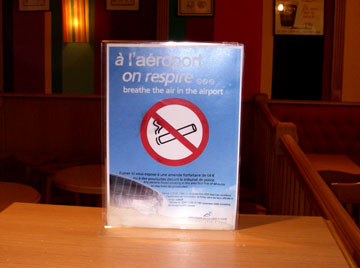 I wonder why Europeans smoke more than Americans. My puzzlement is increased by the fact that Europeans tend to be more health conscious than Americans. For example, the obesity rate for the U.S. is about three times that of Europe (see David M. Cutler and Edward L. Glaeser, Why Do Europeans Smoke More Than Americans?, Figure 2; you can download a PDF here). Moreover, Europeans are usually more liberal than Americans, and in my experience, liberals are more apt than conservatives to restrict smoking and to demonize smokers. So, given Europe’s health consciousness and liberalism, I would expect less smoking in Europe, not more. Thus my wonderment: Why do Europeans smoke more than Americans?
I wonder why Europeans smoke more than Americans. My puzzlement is increased by the fact that Europeans tend to be more health conscious than Americans. For example, the obesity rate for the U.S. is about three times that of Europe (see David M. Cutler and Edward L. Glaeser, Why Do Europeans Smoke More Than Americans?, Figure 2; you can download a PDF here). Moreover, Europeans are usually more liberal than Americans, and in my experience, liberals are more apt than conservatives to restrict smoking and to demonize smokers. So, given Europe’s health consciousness and liberalism, I would expect less smoking in Europe, not more. Thus my wonderment: Why do Europeans smoke more than Americans?
If you have any pet theories of your own, I’d love to hear them. Please add them to the comments section of this blog entry. Meanwhile, I’ll report in on three of my own ideas.
Reason #1: Europeans Smoke More Because They’re Less Aware of the Health Risks Associated with Smoking
Reason #1 is not my own. It’s the conclusion of a recent study by two researchers, David M. Cutler and Edward L. Glaeser. According to Cutler and Glaeser, Europeans do indeed smoke more than Americans, a fact that is made even more surprising by the higher price of cigarettes in Europe and the larger number of anti-smoking regulations. So what accounts for this unexpected difference? “Almost one-half of the smoking difference appears to be the result of differences in beliefs about the health effects of smoking; Europeans are generally less likely to think that cigarette smoking is harmful.”
Of course Europeans have access to the same information about the dangers of smoking that Americans do. But, according to Cutler and Glaeser, anti-smoking activism is much more prevalent in the U.S. than in Europe. While staying with some friends in France, we confirmed this observation. Their four children, who were educated in French schools, heard very little about the health risks associated with smoking. By contrast, my children began learning about such things in kindergarten, and it was emphasized year after year. I remember my kindergarten-aged daughter talking as if all smokers were sure to drop dead in a moment. (As a non-smoker, I didn’t mind my daughter’s bias. But it did seem like the school was exaggerating just a bit.)
In my next post in this series I’ll put up two additional reason why, in my opinion, Europeans smoke more than Americans.
Topics: European Reflections | 4 Comments »















